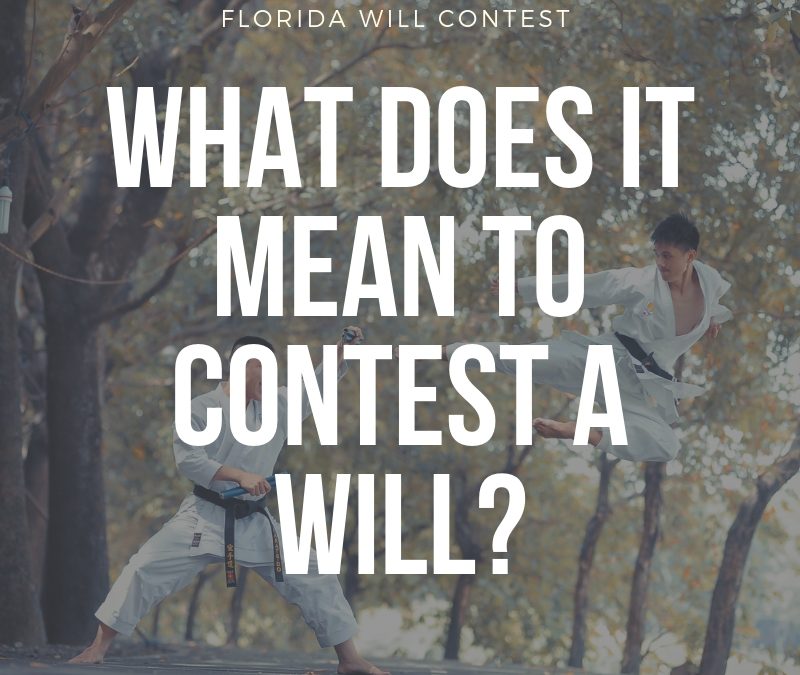Whether you are a potential heir contesting a Will, or the executor defending the Will, you should know that the process of contesting a Will in Florida can be messy. In a nutshell, to contest a Will means that you want the court to throw out an existing Will and consider it void.
Who Can Contest a Will in Florida?
Not just anyone can contest a Will in Florida; you must be an heir who will benefit if the Will is thrown out.
EXAMPLE: Bob had been married just four months when he died, leaving his sizable estate to his spouse in his Will. His brothers and sisters, who long suspected the wife was simply a gold digger, were outraged that they were disinherited. However, if the Will was declared invalid, Bob’s entire estate would still go to his wife under state intestacy laws, so the brothers and sisters lacked standing to contest the Will.
Valid Reasons To Contest A Will
Unfortunately, you cannot contest a Will just because you think your share of the inheritance isn’t “fair.” To have a chance of success in court, one of the following three things must apply:
- Lack of Proper Formalities – In Florida, you must execute a Will following the statutory formalities i.e. it must be properly signed, and be witnessed by two “disinterested” parties.
EXAMPLE: Mr. Smith prepared his Will nearly 50 years ago, witnessed by two colleagues at his accounting firm. However, one witness was dead, the other could not be located at the time of Mr. Smith’s death. So, Mr. Smith’s estranged son, who had been disinherited in the Will, contested it on the grounds that there was no proof (i.e., no witnesses) that the Will was properly executed.
- Lack of Capacity – If you are contesting a Will for lack of capacity, you will need medical records and other evidence to prove that your loved one was not of sound mind when he or she signed the Will. This can be quite difficult because it often turns into an ugly and expensive battle of doctors’ opinions. In addition, many courts recognize a “moment of clarity” when it comes to Wills, further complicating the issue.
EXAMPLE: Mary’s mother had battled dementia for years before she died, and her periods of lucidity were fewer and farther between. Still, Mary’s petition to contest the Will, which left most of her mother’s estate to a local charity, failed because her mother’s doctor testified that she was still capable of lucid thought at the time of her death, that is, she had “moments of clarity” despite her illness.
- Undue Influence – Of all the reasons to contest a Will, this is the hardest one to prove. Undue influence requires proof that the decedent felt compelled to write his or her Will in a certain way for fear of suffering serious reprisals.
EXAMPLE: Sue quit her job to be the sole caretaker of her mother, who suffered from end-stage multiple sclerosis. In her Will, Sue’s mother gave 75% of her estate to Sue, leaving the remaining 25% to be shared between Sue’s sisters, Grace, and Helen. Helen contested her mother’s Will on the grounds that she rewrote it to favor Sue out of fear that Sue would stop caring for her unless she changed her Will. Imagine how hard it would be for Helen to prove her mother’s fears, inner thoughts, and motivations. That’s why these cases are uphill battles.
Other valid reasons to contest a will in Florida, include:
- Fraud – Fraud is present when one heir lead the decedent to create or modify a Will based on fraudulent claims.
EXAMPLE: A deceitful heir told lies about another heir to the decedent in order to get that heir disinherited. An example of this would be when the decedent was lead to believe that an heir had committed a criminal act, had exhibited immoral behavior, or had spoken badly about the decedent to others. If it can be proven that the Will was written or modify based on fraudulent claims, the Will may be thrown out.
- Insane Delusion – The decedent created or modified the Will under a false conception of reality and against all reason and evidence to the contrary.
EXAMPLE: The decedent, acting under the delusion that a potential heir had abandoned them in their hour of need, chose to disinherit that potential heir. But, in reality, the heir was by their side every day. In cases such as these, a will contest may be successfully in getting the Will thrown out.
How To Contest A Will in Florida
Executors and administrators are generally required to notify all heirs (including those who have been excluded or disinherited) that they are initiating probate. This is when you can contest the Will. If you plan to contest, you file a lawsuit and appear in court to state your objections. Know that contested-Will litigation is a long, expensive, and unpredictable process and it can take years to settle a case.
Contact an Experienced
Florida Estate Planning Attorney
Whether you are a potential heir contesting a Will or the executor defending the Will, in order to succeed, you will most certainly need the assistance of an experienced Florida estate planning attorney. Contact Lynchard & Seely, PLLC, either online or by calling 1-850-936-9385, to arrange a consultation with an experienced Florida estate planning attorney who can assist you with this and other Florida estate
Want Help With Your Estate Plan?
Click Below to Schedule a FREE Initial Consultation!
Lynchard & Seely – COVID-19 Update
We want to update you on the steps we are taking to ensure we can continue to meet your legal needs in a secure and reliable manner. This year marks our firm’s 20th year in Navarre, and our team remains fully operational and here to support you and our community...

3 Florida Estate Planning Documents You Need Right Now
Three, fairly simple Florida estate planning documents is all you need. While, other things can help more, these will get you by in a pinch.

Estate Planning For Small Business Owners
Estate Planning for Small Business Owners – You have to think about more when estate planning if you have a business.
Want Help With Your Estate Plan?
Click Below to Schedule a FREE Initial Consultation!

